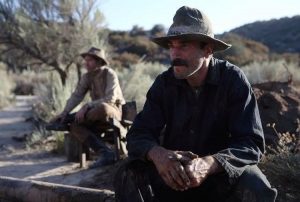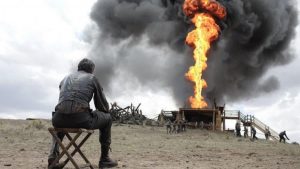There Will Be Blood (2007)

There Will Be Blood (2007), directed by Paul Thomas Anderson, is a cinematic masterpiece that delves deeply into the themes of ambition, greed, power, and isolation. Based loosely on Upton Sinclair’s 1927 novel Oil!, the film is set against the backdrop of the early oil boom in Southern California at the turn of the 20th century. It chronicles the rise of Daniel Plainview (Daniel Day-Lewis), a fiercely driven oilman who becomes consumed by his pursuit of wealth and power at the expense of his humanity.
Suggested videos for you:
Plot Overview
The film begins with a near-wordless 15-minute sequence that introduces Daniel Plainview as a solitary, determined figure. In the opening scene, he is shown mining for silver, where he suffers a severe injury but continues to labor through the pain. This moment sets the tone for the rest of the film: Plainview is a man who endures hardship and sacrifices everything to achieve his goals. His discovery of oil soon transforms him into a wealthy oil prospector, and as the story progresses, we witness his gradual descent into moral and spiritual decay.
The central plot follows Plainview as he adopts an orphaned boy, H.W. (Dillon Freasier), and presents him as his son and business partner. The pair travels across California buying up land for oil drilling. Plainview’s path eventually crosses with Eli Sunday (Paul Dano), a local preacher and self-proclaimed prophet who becomes his nemesis. Eli and his family own a farm on a piece of land rich in oil, which Plainview covets. Their battle for dominance—one rooted in the clash between Plainview’s capitalist ambition and Eli’s religious zealotry—becomes the heart of the film.
Themes
At its core, There Will Be Blood is a meditation on the corrupting power of greed and the isolation that results from the single-minded pursuit of success. Daniel Plainview is an embodiment of ruthless capitalism, driven not only by the desire for wealth but also by an insatiable need for control and superiority over others. As the film progresses, it becomes clear that Plainview is not merely driven by financial gain—he is motivated by a deep-seated hatred for people and a need to dominate those around him.
One of the film’s key themes is the conflict between religion and capitalism, personified in the rivalry between Plainview and Eli Sunday. Eli’s character represents the exploitation of faith, using religion as a tool to gain influence and power over his followers. However, Eli is no moral counterweight to Plainview; he is equally manipulative and self-serving. Their confrontations—most notably during Eli’s exorcism-like baptism of Plainview and the infamous final showdown in the bowling alley—highlight the intersection of greed, faith, and corruption.
The film also explores the concept of isolation. Despite his wealth and power, Plainview is a profoundly lonely figure, cut off from meaningful human connection. His relationship with H.W. deteriorates after a tragic accident causes the boy to lose his hearing, leading to a heartbreaking separation between the two. Plainview’s isolation is not just physical but emotional and spiritual as well; his hatred for others consumes him, leaving him alienated from humanity.
Daniel Day-Lewis’ Performance
Daniel Day-Lewis’ performance as Daniel Plainview is widely regarded as one of the greatest in cinematic history, and it earned him an Academy Award for Best Actor. Day-Lewis fully inhabits the character, bringing a menacing, almost Shakespearean intensity to the role. His portrayal of Plainview is a study in controlled rage and barely restrained ambition. Every gesture, glance, and line of dialogue is delivered with precision, conveying the internal torment and drive that defines the character.
Day-Lewis’ voice in the film—deep, resonant, and filled with gravitas—becomes a defining characteristic of Plainview. The way he speaks, alternating between measured calm and explosive anger, mirrors the duality of his character: a man who can be charming and persuasive in his business dealings, but also violent and vengeful when challenged. The infamous line “I drink your milkshake!” in the film’s final scene has become iconic, not just for its eccentric delivery but for the way it encapsulates Plainview’s greed and need for domination.
The complexity of Day-Lewis’ performance lies in how he makes Plainview both repulsive and compelling. As much as we are repelled by his ruthless behavior, we are also fascinated by his drive and resilience. He is a character driven by primal instincts, yet he is also capable of moments of vulnerability, particularly in his relationship with H.W. The emotional depth that Day-Lewis brings to Plainview elevates the character beyond a simple villain to a tragic figure whose success ultimately leads to his downfall.
Paul Dano’s Performance
Paul Dano’s portrayal of Eli Sunday is equally compelling, though in a different register. Eli is a complex antagonist, a young preacher who, on the surface, appears to be the moral counterweight to Plainview’s greed. However, Dano’s performance reveals Eli to be just as hungry for power and validation as Plainview. Eli’s religious fervor is intertwined with his own ambition, and he uses his position as a preacher to manipulate and control his followers.
Dano excels in the film’s intense, confrontational scenes, particularly when Eli attempts to assert dominance over Plainview. One of the most memorable moments in the film is Eli’s baptism of Plainview, where he forces the oilman to confess his sins in front of the congregation. The scene is a rare moment where Eli appears to have the upper hand, but it also exposes his own hypocrisy and desire for control. Dano’s performance is filled with a kind of youthful zeal, making Eli both pitiable and detestable.
Cinematography and Direction
Paul Thomas Anderson’s direction in There Will Be Blood is nothing short of masterful. The film is meticulously crafted, with every shot designed to evoke a particular mood or theme. Anderson draws inspiration from classic Westerns and early American epics, imbuing the film with a sense of grandeur and scale. The wide, sweeping shots of the barren California landscape underscore the film’s themes of isolation and desolation, while the close-ups on Plainview’s face reveal the emotional and psychological depth of his character.
One of the most striking aspects of the film is its use of silence. The film’s opening sequence, in which Plainview discovers oil, is almost entirely devoid of dialogue, relying instead on Jonny Greenwood’s haunting, dissonant score and the sound of the natural environment. This emphasis on silence creates a sense of foreboding and tension that permeates the entire film.
Greenwood’s score, composed of eerie string arrangements and unsettling rhythms, is integral to the film’s tone. The music is often discordant, mirroring the chaotic and destructive forces at play in Plainview’s life. The score adds to the film’s sense of unease and amplifies the emotional intensity of key moments, such as the oil derrick explosion or the final confrontation between Plainview and Eli.
Visual Symbolism and Imagery
Anderson’s visual storytelling is rich with symbolism and imagery. Oil, the film’s central symbol, represents not only wealth and power but also corruption and destruction. The sight of oil gushing from the earth is both awe-inspiring and terrifying, a representation of Plainview’s success and the violence that comes with it. The oil itself becomes a physical manifestation of Plainview’s greed—black, thick, and suffocating, it covers everything and everyone it touches, leaving behind ruin.
Water, often contrasted with oil, also plays a symbolic role in the film. The lack of water in the arid California landscape represents scarcity and desperation, while the act of “drinking” oil (as metaphorically referenced in the final scene) signifies the consumption and exploitation of natural resources for personal gain.
The Tragic Downfall
There Will Be Blood ultimately tells the story of Daniel Plainview’s tragic downfall. Despite his immense success, Plainview is left utterly alone by the end of the film. His relationship with H.W., the one connection that humanizes him, is severed when he sends the boy away after the oil explosion renders him deaf. The final scene, in which Plainview murders Eli in a fit of rage, is the culmination of his descent into madness and isolation.
The film’s final line, “I’m finished,” delivered by Plainview as he sits in a bloodstained bowling alley, encapsulates the film’s exploration of ambition and destruction. Plainview has achieved everything he set out to do—he is wealthy, powerful, and feared—but he has lost his soul in the process. The emptiness of his victory is a powerful indictment of the destructive nature of unchecked ambition.
Conclusion
There Will Be Blood is an extraordinary achievement in filmmaking, combining stunning performances, masterful direction, and a haunting score to tell a story about the dark side of the American Dream. Daniel Day-Lewis’ portrayal of Daniel Plainview is a tour de force, capturing the complexity of a man consumed by greed and power. Paul Thomas Anderson’s exploration of capitalism, religion, and isolation makes the film not only a gripping character study but also a profound meditation on human nature.
The film stands as one of the defining works of 21st-century cinema, a sprawling epic that challenges the audience to grapple with uncomfortable truths about ambition, morality, and the cost of success.










